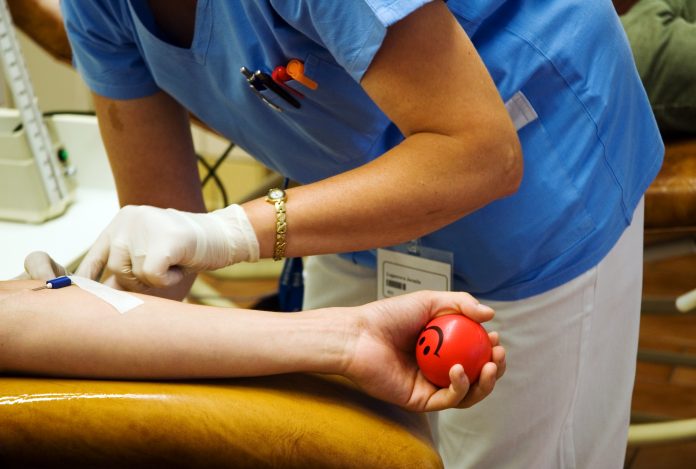A study by the Bloomberg School of Public Health found that severe COVID-19 patients can produce strong antibodies for vaccine testing – especially the older male population
According to the researchers at Johns Hopkins Bloomberg School of Public Health, sex, age, and severity of disease are possibly most useful identifiers of which COVID-19 survivors are likely to create substantial quantities of antibodies that can defend against the disease. This is the first scientific guidance on who to choose, for health professionals who are attempting to use plasma to help patients.
Their data suggests that older males who successfully recovered from COVID-19 after hospitalisation offer the best antibodies – making them the best plasma donors. Plasma contains antibodies, and is currently being floated as a tentative support system for some COVID-19 sufferers who appear unable to generate their own antibodies.
What is convalescent plasma? Can it cure COVID-19?
The most crucial answer is no, convalescent plasma is not a miracle vaccine that will cure COVID-19 across the world.
Plasma is the light yellow substance that makes up roughly 55% of your blood. It is mostly water, but it carries the antibodies that your body makes in response to any virus. The antibodies remain in your plasma for an unknown but crucial amount of time. Vaccine testing is heavily reliant on how the survivors have survived, working backward from that desired outcome.
Convalescent plasma is the attempt to transfer those biologically-equipped fighters from a successful war to a struggling battlefield, via blood transfusion.
This method has been used to treat people who were highly vulnerable throughout the history of medicine – from outbreaks of measles to the 1918 pandemic flu. Soviet and German studies of seasonal flu in the 1950s and 1960s proved that using plasma could be efficient and successful. Convalescent plasma is the go-to method for preventing Junin Virus in Argentina, preventing 90% of possible deaths from the virus.
This method has been used to treat people who were highly vulnerable throughout the history of medicine – from outbreaks of measles to the 1918 pandemic flu.
Writing about ways to tackle the deadly H5N1 Asian virus in 2008, Managing Director for the US Food and Drug Administration, Jay Epstein said: “In a pandemic, vaccines, effective antiviral drugs, respirators and antibiotics may not be available timely, with resultant high mortality. Convalescent plasma can be made locally, and evidence exists suggesting that transfusion of convalescent plasma could save lives.”
Study lead author Sabra Klein, PhD, professor in the Bloomberg School’s Department of Molecular Microbiology and Immunology, said: “We propose that sex, age, and severity of disease should be used to guide the selection of donors for convalescent plasma transfer studies because we found that these were significant patient characteristics that not only predicted the amount of antibody but the quality of that antibody.”
126 COVID-19 survivors donate plasma for vaccine testing
The study, published October 19 in the Journal of Clinical Investigation, was a collaboration with several other research groups including that of Arturo Casadevall, MD, PhD, Bloomberg Distinguished Professor and chair of the Department of Molecular Microbiology and Immunology, and co-corresponding author Aaron Tobian, MD, PhD, professor in the Department of Pathology and director of the Transfusion Medicine Division at the Johns Hopkins School of Medicine.
For their study, the researchers tested the blood of 126 COVID-19 survivors and found high variability in their antibody levels and their antibodies’ ability to neutralise the COVID-19-causing coronavirus, SARS-CoV-2.
Three factors were associated with stronger antibody responses:
- Having been sick enough with COVID-19 to be hospitalised;
- Being older;
- And being male.
The researchers examined samples of plasma from the 126 recovered patients using several tests. “We know that the magnitude of antibody responses correlates with disease severity in other infectious diseases, such as active tuberculosis,” Klein says.
Consistent with several prior studies, the researchers found considerable variability among the subjects in their spike-protein antibody levels and plasma coronavirus-neutralisation possibility. But on average, the plasma of survivors who had been hospitalised with COVID-19 had markedly more anti-spike protein antibodies and neutralised the virus more effectively – this suggests that disease severity creates a stronger immune response.
the plasma of survivors who had been hospitalised with COVID-19 had markedly more anti-spike protein antibodies
As part of their study, the researchers also tested study participants with commercial test kits and found that recovered COVID-19 patients who have strong neutralising antibody responses also are very likely to have high levels of coronavirus anti-spike antibodies. This suggests that this type of test kit, which is relatively inexpensive, might be a good tool for identifying suitable plasma donors for clinical trials and treatments.
How can you donate plasma in the UK?
The NHS are looking for anyone who survived COVID and is over the age of 17 to donate plasma. There are now 42 donation centres across the country, which are located close to large populations of people. As the availability of a vaccine becomes more distant a possibility, with key vaccine testing trials currently experiencing issues and the logistical framework for administering a drug under debate, convalescent plasma has become the only immediate help. As the FDA’s Jay Epstein said: “Convalescent plasma is likely to be used in a flu pandemic when alternative prevention and therapy modalities are lacking or fail to be effective.”
In keeping with the research available about demographics with greatest likelihood of creating strong antibodies, the NHS are particularly asking for donations from:
- Men;
- People aged over 35;
- People from Asian communities;
- And people who were treated in hospital.
We’re opening 14 more pop-up donor centres for the world’s largest randomised trial of blood plasma as a treatment for COVID-19.
If you’ve had coronavirus, please volunteer to donate plasma. You could save lives. https://t.co/wXTdhXudBq pic.twitter.com/HgD6BiK43m
— NHS Blood+Transplant (@NHSBT) October 19, 2020
“We have so far seen a fantastic response from the public coming forward to donate plasma,” said Professor David Roberts, associate medical director for blood donation at NHSBT.











